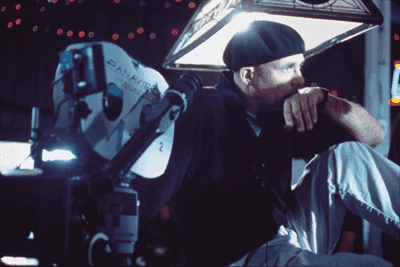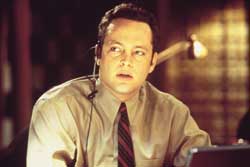COLD CALLING
Writer/director Douglas McGrath talks with The Prime Gig director Gregory Mosher about his segue from theater to film.
 |
| Director Gregory Mosher on the set of Prime Gig |
At the outset, Gregory Mosher must have seemed an obvious choice to direct Bill Wheeler’s script of The Prime Gig. A high-stakes morality tale set amid the verbal acrobatics of professional phone pitchmen, the script offered the entertainingly verbose, testosterone-fueled rages of vintage David Mamet. And Mosher, of course, is the celebrated theater director known for helming on Broadway such Mamet classics as Glengarry Glen Ross and Speed the Plow.
But what’s surprising about The Prime Gig is Mosher’s decision to locate meaning in the moments between the lines. Eschewing a typical rat-a-tat-tat style, Mosher hooked up with legendary cinematographer John Alonzo (Harold and Maude, Chinatown, Farewell, My Lovely, Scarface, Internal Affairs) to create a poetic morality tale that harkens back as much to the ’70s work of Ashby and Rafaelson as it does to their flashier, genre-inflected followers.
We asked Douglas McGrath, screenwriter with Woody Allen of Bullets Over Broadway and writer/director of Emma and, with Peter Askin, the forthcoming political comedy Company Man, to sit down with Mosher and discuss his journey from stage to screen.
DOUGLAS McGRATH: How did this film come to you?
GREGORY MOSHER: [Producer] Cary Woods just called me out of the blue. He’d seen the Broadway production of Glengarry Glen Ross I directed and made a connection. We both wanted Vince Vaughn, and when he said yes, we were off and running.
McGRATH: So you liked the Glengarry aspect of the script?
MOSHER: Well, sure, that’s a terrific world – hustlers, losers – it’s hard to go wrong. On the other hand, I’m not interested in real-estate sales any more than I am in illicit phone sales, no matter how high the stakes. Neither, I dare say, are audiences, although we might be interested in the real-world counterparts, like the stock market or dot-com start-ups. These worlds are just high-energy environments in which to set a tale. What [screenwriter] Bill Wheeler has done is to take the con artist’s stock in trade – trust – and play it out simultaneously in professional, personal and romantic contexts. Vaughn works for master con artist Ed Harris and thinks he can scam him. Moreover, he thinks he can take away Harris’ protégé and lover, played by Julia Ormond. They’re all con artists. Now, if you’re in Vince’s character’s situation, whom do you trust? If you’re skeptical of everything and everyone, you can’t get much out of life. If you trust, you can get hurt pretty badly. That’s a good setup for a movie. Is it worth a year of my life and 97 minutes of yours? I hope so, because we all grapple with it daily, in business and in personal relationships.
McGRATH: Not only do the characters change in this movie, but the situations they are in do as well. You keep peeling the onion.
MOSHER: As I said, con artists deal in trust – giving, gaining and exploiting it. So we try to work the audience through a series of situations where what they think they know to be true turns out not to be the case. We play with your trust – not by abusing it but by pointing out that you misjudged the evidence at hand. The problem with this approach, or at least the hardest thing about it, is that audience members don’t all move at the same speed. An ex-girlfriend, for instance, used to have the maddening habit of leaning over five minutes into any film and telling me the ending. I, on the other hand, am still trying to figure out if Bruce Willis was dead [in The Sixth Sense]. So the hardest work for Wheeler and me was plotting a story that would work for both the skeptics and the trusters. That means that, as with [M. Night] Shyamalan’s film, you can’t cheat. You have to be able to replay the movie in your head and say, "Of course."
McGRATH: You’ve directed a lot of theater, but as a filmmaker you were technically a first-timer when you made this film. What was the hardest thing about the process?
 |
| Vince Vaughn in Prime Gig |
McGRATH: When you talk about keeping it all in your head, was it the shots you were concerned about or the emotions of the characters?
MOSHER: It was truly just the shot structure. To end a scene on a medium shot and begin the next on another medium shot I thought was just kind of … I should try to be better than that. You know, most great films are brilliant juxtapositions of quite simple images.
McGRATH: When we were shooting Emma, I always thought about how to shoot each scene, but I never thought about how to get from one scene to the next. Very early on, we had a wonderful production designer named Michael Howells who said, "How are you going to go from here into the apple orchard?" And I began to find that an exhilarating thing to think about, because when you watch a film that does it well – and your film does it very well – it’s so gratifying, because you feel like you are being carried.
MOSHER: Well, you’re kind. This film does it okay, but if you look at a film like Chinatown, you just throw up your hands. And Polanski swears he doesn’t make up the shots ahead of time. Well, fuck you, Polanski!
McGRATH: The look and tone of the film reminded me of movies from the ’70s.
MOSHER: The look and the feel were very influenced by the great films of that period, and of course having Chinatown’s cinematographer, John Alonzo, highlights that feeling. When I first read the script, the character Vince plays reminded me of those characters Nicholson used to play 25 or 30 years ago, or Newman in The Hustler. They’re not Jimmy Stewart heroes, nor are they the kind of hip antiheroes you see today. So it was the unresolved nature of the leading character that led us to a ’70s visual framework.
McGRATH: When you look back on it now, what do you think is the thing you’re proudest of in the film?
MOSHER: Well, what I’m proudest of is, it may be a good movie, it may not be a good movie, I don’t know, but it is a movie. It’s not a television show. I was saying to a friend a while ago, though, that the problem with this movie is that it doesn’t look like the first movie by a very talented director. It looks like the fourth movie by a reasonably talented director. You know, it doesn’t have that kind of, "Oh fuck it, I’m going to show the world" pizzazz to it that you want to see [in a first film].
McGRATH: So many of your shots are – well, they’re beautifully framed. But you’ll have a character on the left, and then you’ll just have all this – I’m trying to think of a nice word for it – nothing.
MOSHER: It’s composition.
McGRATH: Yeah, it’s just wonderful. Because so much of what we see now is somebody in the center of the frame, so that when it’s cut for TV you don’t miss anything.
MOSHER: This was one of the advantages of having a certified master shooting. If someone even thought about saying, "How is this going to work on TV," John would just return a withering look that would say, "Are we making a television movie, or are we making a movie?"
McGRATH: Did you make any effort to sharpen your own visual thinking before the film?
MOSHER: For years I would watch five movies a day.
McGRATH: Five movies a day?!
MOSHER: Sure. It can be frustrating to be a middle-aged beginner, but it’s also exhiliarating to throw yourself into something new. I still take a day and watch four movies, or one movie four times. You’re sitting there, out of your mind with awe at what Kurosawa or some genius is doing. And you think – this is today’s "to do" list.
McGRATH: I know. For most people, that’s a sign of joblessness. For us, it’s research!
MOSHER: I didn’t go to film school, so watching thousands of films was my education. I watched with the sound off, or watched a section and wrote down the shots from memory, things like that. And you slowly start to become aware of the most basic thing, that a movie is put together with cuts, and that it’s this juxtaposition of images – which you sometimes shoot weeks apart – that create emotion and tell a story, and reveal human nature. Just taking pictures of the actors talking isn’t going to cut it.
McGRATH: When you study a great film and watch it over and over, you see how the miracle happens, what it was that made you fall in love with that movie. You may not crack all of it, you may not break the alchemy down altogether, but you suddenly get a little glimpse, a little peek behind the curtain into how they make something so wonderful and miraculous happen.
MOSHER: When I first started thinking about directing a film, I asked Mike Nichols if he had any advice. He said, "Watch A Place in the Sun 25 times, and then watch it 25 more times, and then call me and we’ll talk." And I thought it was so interesting that he chose that film rather than Citizen Kane, Stagecoach, The Rules of the Game or Grand Illusion.
McGRATH: Why do you think he chose that film?
MOSHER: Because it’s sort of all there. The entire [cinematic] vocabulary you need is in that movie.
McGRATH: Woody [Allen] loves that film, too.
MOSHER: Oh, it’s a remarkable film. I did of course watch it 50 times.
McGRATH: What I like about Prime Gig is the way it’s shot and cut. Sometimes you don’t find out until the end of a scene that [another character] is in the room. It gives a scene a wonderful twist.
MOSHER: It’s a cinematic version of the unreliable narrator. I cannot tell you how important John Alonzo was in all of this.
McGRATH: He’s done a wonderful job. So your advice to first-time directors would be, get a big genius to be your d.p.?
MOSHER: It was every director’s advice to me: get a great cinematographer. And in the beginning I would say, "What, am I going to get a bad cinematographer? Of course I’m going to get a good cinematographer!" And they would say, "You’re not listening, a great cinematographer who has nothing to prove, who has worked with people who – let’s be honest, you can’t shine their shoes – will be totally there with you and save you from your worst mistakes. That’s what you need."
VOD CALENDAR


 See the VOD Calendar →
See the VOD Calendar →


